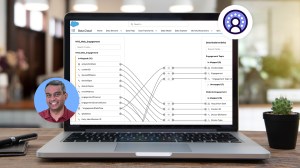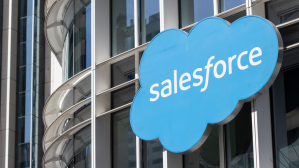Data Cloud is Salesforce’s hyperscale data engine, a foundational component of the Einstein1 Platform that unifies a company’s structured and unstructured data to create a 360-degree view of its customers. This allows employees on any team to quickly access and act on real-time customer information across their product and service interactions. Data Cloud also powers automation, predictive, and generative AI and analytics across the world’s #1 AI CRM.
Data Cloud’s success is generating industry recognition: Salesforce was recently named a Leader in the Gartner® Magic Quadrant™ for Customer Data Platforms (CDP). “We believe this recognition underscores the pivotal role of data and AI in delivering exceptional customer experiences and driving growth for Salesforce customers across every business application,” said Rahul Auradkar, Salesforce’s EVP and General Manager of Unified Data Services & Einstein.
In this interview, Auradkar explores the evolution of Data Cloud, and shares what’s on the horizon for this disruptive innovation.
Q. How does Data Cloud differ from traditional CDPs on the market today?
Data Cloud brings a company’s disconnected, structured, and unstructured enterprise data together to deliver an actionable, comprehensive, 360-degree view of a customer. Data Cloud provides data and AI-driven experiences and activation across all touchpoints and channels.
Other CDPs were built for marketers, making it not easily accessible or usable by other business functions without custom solutions, custom APIs, queries, and multiple requests. Companies were required to develop and maintain custom solutions to bring trapped data to life, unlock the power of AI, and directly benefit customer experiences in the flow of work.
Full Customer 360 view in Data Cloud
With an open and extensible architecture (BYOL, BYOM, zero-ETL integration) that is native to the Einstein 1 Platform, Data Cloud leverages the power of Salesforce metadata. This flexibility enables companies to ingest or federate data across all sources including Snowflake (generally available in March), AWS Redshift (currently in pilot), Google BigQuery (generally available in March), and Databricks (currently in pilot), harmonize and unify the data to power automation, activation, and analytics, and take action across sales, service, marketing, commerce, and other customer engagement scenarios.
By bringing the power of structured and unstructured data together, Data Cloud offers quick and secure entry into predictive and generative AI, helping make outcomes accurate, relevant, and grounded with your company’s data.
Q. Why did Salesforce develop Data Cloud?
As the #1 AI CRM provider, Salesforce’s mission has always been to help make our customers into customer companies, including bringing the power of data and AI to deliver amazing integrated experiences.
Despite efforts to centralize data and build a 360-degree customer view in their CRM, most company data remains disconnected, and therefore unusable or only partially effective to improve the customer experience. In fact, 80% of customers expect customer experiences to improve given the amount of data companies collect.
Many customers have invested in migrating their data to the cloud and implementing data governance policies. Some have even invested in marketer-specific CDPs. Why? Marketers have concerns about trapped customer data that is not easily accessible or usable without custom APIs and constant requests to the data team. While CDPs exist, they don’t always meet the mark.
Nearly 70% of companies say their customer interactions are now purely digital, yet only 26% of organizations report providing a completely connected experience across all channels. And, 81% of business leaders report that data silos are hindering their digital transformation efforts.
The data our customers have about their customers should be a competitive advantage.
Rahul Auradkar, EVP and General Manager of Unified Data Services & Einstein
We knew that if we were going to build a true customer data platform, it could not be another silo just for marketers. We had to unleash this data across our entire suite of applications and make that data useful for insights, AI, and actionability. The data our customers have about their customers should be a competitive advantage for our customers.
Q. Salesforce went from not having a CDP to being named a Leader in the 2024 Gartner® Magic Quadrant™ for Customer Data Platforms in just over three years. What do you attribute that to?
Salesforce has been the leader in the CRM market for over two decades. Customer success is one of our core values, and we actively listen to customer feedback and insights to fuel our product development. It became abundantly clear that all the structured and unstructured data customers have is not used effectively for them to engage with their customers. The explosion of digital transformation and the secular shift toward privacy makes the value of first-party data increasingly valuable.
Salesforce rose to the challenge to deliver Data Cloud as an organic innovation. It is our fastest-growing organic innovation with astonishing growth and tremendous customer adoption and success. Over the past quarter, Data Cloud processed 7 trillion inbound records, with 1.2 trillion activations that drove customer engagement, growing at an astonishing pace. We innovated across our platform capabilities, applications, and core clouds on the same metadata layer that made us successful.
We are humbled and excited about Data Cloud’s success and the value we are delivering to our customers, while at the same time, moving the industry forward with our innovation at a rapid clip.
Q. What value does Data Cloud provide for businesses?
Data Cloud brings disconnected and trapped structured and unstructured data together to deliver an actionable, comprehensive, 360-degree view of customers. It empowers teams across organizations with access to real-time data and insights about their customers and their interactions with its products and services, enabling them to deliver personalized customer experiences at every touchpoint. Key benefits include:
- Bringing all of their customer data into Salesforce across the entire enterprise into Data Cloud with clicks, not code or custom API integrations:
- Zero-ETL partnerships: We’ve partnered with Snowflake, Databricks, AWS, and Google to enable zero-copy/ETL with Data Cloud. Companies can access and act on their data without moving or copying it, supporting data integrity.
- Salesforce connectors: With Data Cloud, organizations can integrate all of their data across their Salesforce investments with just a few clicks.
- Out-of-the-box connectors: We built and are consistently adding to our library of connectors that enable businesses to leverage pre-built connectors to cloud storage like Amazon S3.
- MuleSoft: We have the #1 AI CRM but we also have the #1 integration and API platform with MuleSoft, enabling customers to connect any system or any type of data into Data Cloud seamlessly.
- Building a comprehensive view of the customer for better insights for customer engagement using BI and AI insights:
- Transform & Harmonize data: Data Cloud enables businesses to consolidate and refine their source data without using third-party zero-ETL tools. With a user-friendly interface, businesses can easily map their enterprise data to a common model, creating a unified view of their customers.
- Create Identity Resolution: Once the data is transformed, companies can leverage our identity resolution to build a single view of their customers across all of their products and services, accessible across the organization.
- Analyze and Predict: With native features built right in the platform, customers can run AI/BI insights on the unified data. Whether it is creating new insights like churn score, lifetime value, or applying a company’s own AI models with our Bring Your Own Model (BYOM) technology.
- Activating data across the entire customer experience:
- Activation across the Customer 360: Data Cloud is built to be native to the Einstein 1 Platform and leverages BI and AI insights to drive amazing integrated activations across the Customer 360, including sales, service, marketing, ecommerce, privacy-safe, paid-media AdTech activation, and more – multiplying the value of every customer engagement and interaction.
Q. Why is data so critical in the age of generative AI?
The AI revolution is a data revolution and is also a trust revolution. The quality of generative AI output is directly linked to the relevance and context of the data that fuels it. In fact, 58% of workers believe that trusted customer data is essential for successfully utilizing generative AI in their roles. However, 62% of IT leaders say their organization isn’t yet equipped to harmonize data systems to fully leverage AI. What’s more, 90% of enterprise data exists in unstructured formats such as PDFs, emails, social media posts, and audio files, making it largely inaccessible for business applications and AI models.
The AI revolution is a data revolution and is also a trust revolution.
Rahul Auradkar, EVP and General Manager of Unified Data Services & Einstein
And while 80% of IT leaders acknowledge the transformative potential of generative AI in leveraging data more effectively, 59% still require a unified data strategy to unlock this power. This is where Data Cloud plays a pivotal role.
Q. What are some interesting Data Cloud use cases you’ve seen from customers?
Customers of every size, across every industry, are using Data Cloud to transform their business and redefine what a CDP can and should do.
For example, Mascoma Bank uses Financial Services Cloud with Data Cloud to see a customer’s entire relationship with the bank and understand activity surrounding the customer and their accounts. By using Salesforce as its single source of truth for all customer, account, and transaction data, bankers are now better equipped to help their clients reach their financial wellness goals.
Heathrow Airport also uses Salesforce Data Cloud and Einstein — grounded in the real-time data of tens of millions of passenger records — to personalize interactions with customers, allowing the airport to provide the right services to the right passengers at the right time. Data and AI-powered experiences also allow the airport to anticipate passenger needs before their next airport visit.
And, FedEx is improving the customer experience through recent investment in Salesforce Data Cloud by integrating customer service, marketing, and sales, giving the customer a more informed, efficient, and personalized experience.
Learn more:
- Explore Data Cloud
- Read more about Salesforce being named a Leader in the Gartner Magic Quadrant for Customer Data Platforms and download the 2024 Gartner® Magic Quadrant™ for Customer Data Platforms report
- Learn more about Salesforce’s trusted AI & data architecture
Any unreleased services or features referenced here are not currently available and may not be delivered on time or at all. Customers should make their purchase decisions based upon features that are currently available.















